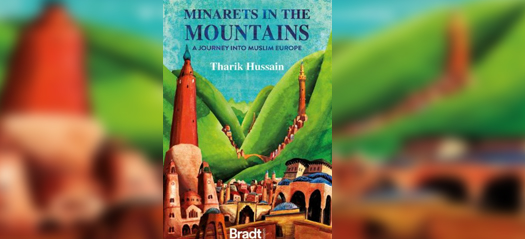
Minarets in the Mountains: A Journey into Muslim Europe by Tharik Hussain. Brandt Travel Guides, pages 352, paperback. July 2021. £9.99.
A Moroccan proverb, “Travel, and you will see the meaning of things”, best sums up Tharik Hussain’s fascinating journey into the heart of Muslim Europe. As travel writing goes, this is an unconventional biographical travelogue that shuns any pretence of cultural or religious neutrality in favour of an overtly Muslim disposition.
The stock in trade writings on ‘travel in Muslim lands’, historically, has been undertaken by white males, with a sprinkling of white women colonizing the genre. This has not only been confined to the written medium but also cuts across television and radio and not only with travel but also with western perspectives on food and culinary adventures, excursions into historical legacies in art, architecture and customs. This writing has been infatuated with romanticizing the exotic, expunging real histories, cleansing personal experiences and orientalising the “other”.
In Orientalism, the late Edward Said writes: “Indeed it can be argued that the major component in European culture is precisely what made that culture hegemonic both in and outside Europe: the idea of European identity as a superior one in comparison with all the non-European peoples and cultures.
There is, in addition, the hegemony of European ideas about the Orient, themselves reiterating European superiority over Oriental backwardness, usually overriding the possibility that a more independent, or more sceptical, thinker might have had different views on the matter.
In quite a constant way, Orientalism depends on its strategy on this flexible positional superiority, which puts the Westerner in a whole series of possible relationships with the Orient without ever losing him the relative upper hand.”
Hussain’s exploration into the heart of Europe’s Muslims is done with the eye of a travelling medieval detective—a cross between Colombo and Ibn Battuta with a back up and mobile phone as accompaniments—sniffing out clues, instinctively tracking a hunch and doggedly following the footsteps of Ottoman explorer, Evliya Çelebi–a latter-day Google mapper.
The Ottoman Empire’s legacy comes alive through Hussain’s Muslim lenses as his grand voyage begins at the most distant end of another Empire, Britain, traversing the Muslim Empire’s south-eastern borders–Bosnia, Serbia, Kosovo, Bulgaria, Montenegro and North Macedonia.
The accidental ‘discovery’ of a Muslim village in the heart of Bulgaria gives a fascinating insight into the hidden heritage of Balkan Islam. Under Communism, religion and all its manifestations, especially Islam and Muslims, came under wide-ranging and systematic persecution.
Minorities, including the Muslim Roma (Gypsies), Pomaks, Bulgarian-speaking Muslims, and Turkish Muslims were forced to change their names from Arabic into conventional Slavic ones. In the winter of 1984/85, thousands of Turks were forced to give up their identities and, in the process, hundreds were killed, and thousands were imprisoned for resisting the Government’s attempts at assimilation.
In 1989, the Communist Government expelled 370,000 Turks, leading to widespread protests and resistance, which eventually led to the regime’s collapse.
Every step of the way, Hussain’s numerous vignettes provide a vivid, evocative and instructive snapshot of the deeply embedded cultural, religious and social institutions and practices that have made this part of Europe a living Muslim heritage. Minarets in the Mountains is signposted along the journey by the mosques–historic and modern, people, halal restaurants, tombs and relics of history, destroyed through war, conflict and social and cultural engineering.
Hussain’s meticulous anecdotal attention to detail–historical and modern–provides a humorous reflection on the Muslim presence in Europe. Far from being inimical to Europe, Islam and Muslims have been the very essence of a Europe that was once underpinned by a mosaic of cultures, religions and customs.
he age of tolerance has been replaced by sinister and dark forces determined to sanitize European history from its multiracial and multicultural legacy. From the buffoonish leader of Britain, Boris Johnson, to the resurgence of white supremacists across the once Balkan enclaves, Minarets in the Mountains is an unapologetic odyssey to unearth the hidden and unmistakable gems of Muslim Europe.
In undertaking the grand voyage, Hussain is unequivocal in his mission, “Walking in the footsteps of such a cultured expert of historic Muslim Europe as we went in search of its modern equivalent meant that, even if the history and heritage we were looking for were no longer there, Evliya might still offer us a glimpse–and in doing so, remind us just how ‘Muslim’ Europe once was.”
Minarets in the Mountains is a must-read for all interested in the current and historical vibrancy of Islam’s endowment to Europe. Despite attempts at erasure, the fragments of that history have stood and will stand the test of time.
Mahomed Faizal
Media and Communications Adviser